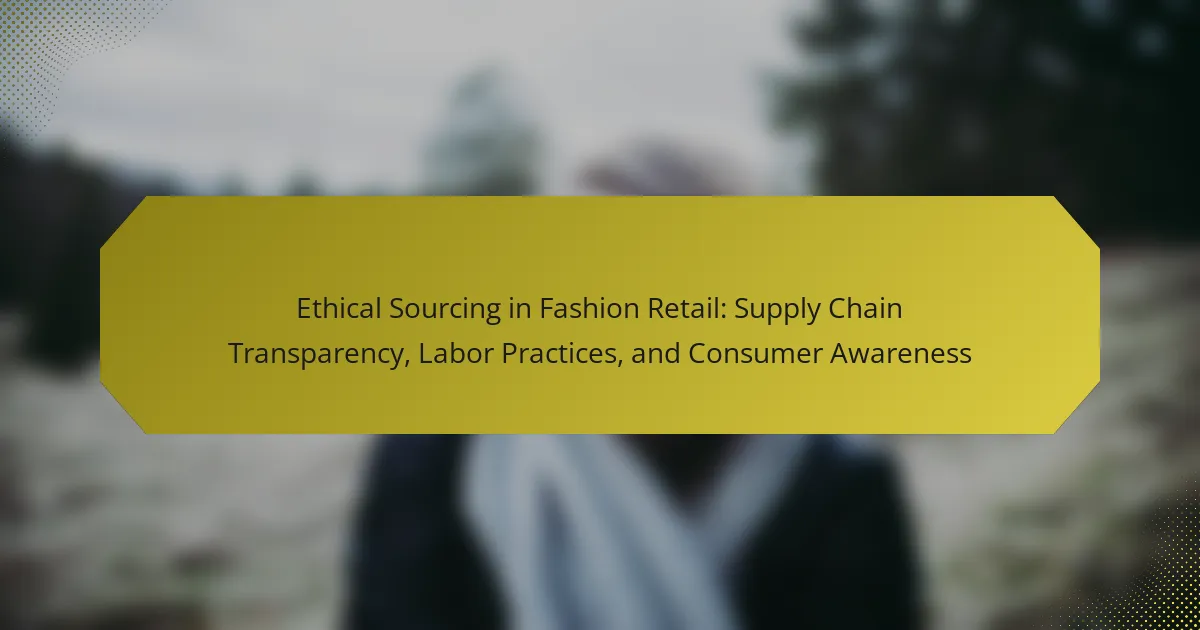
What is Ethical Sourcing in Fashion Retail?
Ethical sourcing in fashion retail refers to the practice of obtaining materials and products in a responsible manner. This includes ensuring fair labor practices, environmental sustainability, and transparency throughout the supply chain. Companies engaged in ethical sourcing prioritize the well-being of workers and the ecological impact of their operations. For instance, according to the Ethical Fashion Forum, ethical sourcing can lead to improved labor conditions and reduced environmental harm. This approach not only benefits the planet but also enhances brand reputation among increasingly conscious consumers.
Why is Supply Chain Transparency Important in Fashion Retail?
Supply chain transparency is crucial in fashion retail because it builds consumer trust and accountability. Transparent supply chains enable consumers to know the origins of their products. This knowledge helps consumers make informed purchasing decisions. According to a 2021 McKinsey report, 66% of consumers consider sustainability when making fashion purchases. Furthermore, transparency can reduce the risk of unethical labor practices. Brands that disclose their supply chain practices are more likely to attract ethical consumers. Research shows that transparency can lead to improved brand loyalty and sales. Thus, supply chain transparency is essential for ethical sourcing and consumer awareness in fashion retail.
What are the key components of supply chain transparency?
The key components of supply chain transparency include visibility, traceability, and accountability. Visibility allows stakeholders to see the entire supply chain process. This encompasses the flow of materials, information, and finances. Traceability enables tracking of products from origin to end-user. It ensures that each step in the supply chain can be verified. Accountability involves holding all parties responsible for their actions. It ensures compliance with ethical standards and regulations. These components are essential for fostering trust among consumers and stakeholders. Research by the World Economic Forum highlights the importance of transparency in enhancing sustainability and ethical practices in supply chains.
How does transparency impact consumer trust?
Transparency significantly enhances consumer trust. When brands openly share information about their sourcing practices, consumers feel more informed. This openness fosters a sense of reliability and accountability. Studies show that 94% of consumers are likely to be loyal to a brand that offers complete transparency. Brands that disclose their supply chain details often see increased customer loyalty and sales. Transparency also reduces skepticism and enhances brand reputation. For instance, companies that publish sustainability reports often experience improved consumer perceptions. In summary, transparency serves as a critical factor in building and maintaining consumer trust.
What Labor Practices are Considered Ethical in Fashion Retail?
Ethical labor practices in fashion retail include fair wages, safe working conditions, and reasonable working hours. Workers should receive compensation that meets or exceeds the local living wage. Safety standards must be upheld to prevent workplace injuries and ensure a healthy environment. Working hours should not exceed legal limits and should include breaks. Child labor and forced labor are strictly prohibited. Transparency in supply chains is essential for accountability. Brands should disclose their manufacturing processes and labor conditions. These practices promote respect for human rights and improve overall industry standards.
What are the common labor standards in ethical sourcing?
Common labor standards in ethical sourcing include fair wages, safe working conditions, and the prohibition of child labor. Fair wages ensure that workers receive compensation that meets or exceeds local living standards. Safe working conditions require that employers provide a work environment free from hazards and conducive to health. The prohibition of child labor mandates that no individuals under a certain age are employed, protecting children from exploitation. Additionally, ethical sourcing often emphasizes the right to organize and engage in collective bargaining, allowing workers to advocate for their rights. These standards are supported by organizations like the International Labour Organization (ILO), which sets guidelines for labor practices globally.
How do labor practices affect brand reputation?
Labor practices significantly impact brand reputation. Companies known for fair labor practices tend to build positive brand images. This leads to increased consumer trust and loyalty. Conversely, brands associated with poor labor practices face public backlash. Reports of unethical labor conditions can result in boycotts and negative media coverage. For instance, a 2020 survey by the Ethical Consumer showed that 61% of consumers consider labor practices when making purchasing decisions. Brands that prioritize ethical labor practices often experience enhanced market performance. This demonstrates a clear link between labor practices and brand reputation.
How can Consumers Promote Ethical Sourcing in Fashion?
Consumers can promote ethical sourcing in fashion by choosing brands that prioritize transparency and fair labor practices. They can research the supply chains of their favorite brands. Consumers should look for certifications like Fair Trade or GOTS. Supporting local and sustainable brands also encourages ethical sourcing. Engaging in conversations about ethical fashion raises awareness. Sharing information on social media can influence others to make informed choices. Attending events focused on sustainable fashion promotes ethical practices. Lastly, consumers can demand better practices by providing feedback to brands.
What information should consumers look for when shopping ethically?
Consumers should look for information on a brand’s supply chain transparency, labor practices, and environmental impact when shopping ethically. Supply chain transparency indicates how openly a brand shares details about its sourcing and production processes. Consumers should seek brands that disclose the origins of their materials and the conditions under which products are made. Labor practices are crucial; ethical brands ensure fair wages and safe working conditions for workers. Certifications such as Fair Trade or GOTS (Global Organic Textile Standard) can verify these claims. Additionally, consumers should assess a brand’s commitment to sustainability and environmental responsibility. This includes the use of eco-friendly materials and practices that minimize waste. Research shows that 66% of consumers are willing to pay more for sustainable brands, highlighting the demand for ethical shopping.
How can consumers influence brands to adopt ethical practices?
Consumers can influence brands to adopt ethical practices through purchasing choices and advocacy. By choosing to buy from brands with ethical standards, consumers signal their preferences. This can lead to increased sales for ethical brands, prompting others to change. Social media campaigns amplify consumer voices. These platforms allow consumers to share information and mobilize support for ethical practices. Transparency demands also arise from consumers. They request information about sourcing and labor practices. Studies show that 66% of global consumers are willing to pay more for sustainable brands. This willingness drives brands to adopt ethical practices to meet market demand.

What are the Challenges of Implementing Ethical Sourcing?
The challenges of implementing ethical sourcing include supply chain complexity, high costs, and lack of transparency. Supply chains in fashion retail often involve multiple layers, making it difficult to trace the origin of materials. High costs can arise from sourcing sustainable materials and ensuring fair labor practices. Many suppliers may not comply with ethical standards due to economic pressures. Additionally, a lack of transparency can hinder consumer trust and accountability. According to a 2020 report by McKinsey & Company, 66% of consumers expressed concern over sustainability in fashion but only 30% felt brands were transparent about their sourcing practices. This gap highlights the ongoing challenges in adopting ethical sourcing effectively.
What barriers do brands face in achieving ethical sourcing?
Brands face several barriers in achieving ethical sourcing. One major barrier is the lack of supply chain transparency. Many brands struggle to trace the origins of their materials. This makes it difficult to ensure ethical practices are followed. Additionally, labor practices in sourcing countries can be problematic. Issues such as low wages and poor working conditions are prevalent. Brands may also face pressure to reduce costs, which can compromise ethical standards. Consumer awareness and demand for ethical products are growing, but many consumers still prioritize price over ethics. Finally, regulatory frameworks vary significantly across countries, complicating compliance for global brands.
How does cost impact the adoption of ethical sourcing?
Cost significantly impacts the adoption of ethical sourcing. Higher costs associated with ethical sourcing can deter companies from implementing these practices. Ethical sourcing often requires investment in fair labor practices and sustainable materials. Many businesses prioritize profit margins, making cost a critical factor. A study by the Ethical Trading Initiative found that companies perceive ethical sourcing as financially burdensome. However, long-term benefits include improved brand reputation and customer loyalty. This can offset initial costs and drive adoption over time.
What role does consumer demand play in overcoming these barriers?
Consumer demand significantly influences the overcoming of barriers in ethical sourcing in fashion retail. Increased consumer interest in sustainable and ethically sourced products pressures brands to adopt transparent supply chains. This demand leads to greater accountability among manufacturers regarding labor practices. As consumers prioritize ethical considerations, retailers are motivated to improve their sourcing strategies. Research indicates that 66% of global consumers are willing to pay more for sustainable brands. This willingness drives companies to invest in ethical supply chain practices. Consequently, consumer demand acts as a catalyst for change, pushing the industry towards more responsible behavior.
How can Brands Ensure Compliance with Ethical Standards?
Brands can ensure compliance with ethical standards by implementing comprehensive ethical sourcing policies. These policies should include clear guidelines on labor practices, environmental sustainability, and fair trade. Regular audits of suppliers help verify adherence to these standards. Training programs for employees and suppliers promote awareness of ethical practices. Transparency in supply chains is crucial; brands should disclose sourcing information to consumers. Engaging with third-party certification organizations can enhance credibility. Monitoring social media and consumer feedback provides insights into public perception. Research indicates that 66% of consumers are willing to pay more for sustainable brands.
What auditing processes are effective for ensuring compliance?
Effective auditing processes for ensuring compliance include regular internal audits, third-party assessments, and risk-based evaluations. Internal audits help identify non-compliance issues within an organization. They focus on adherence to internal policies and regulatory requirements. Third-party assessments provide an objective review of compliance practices. These assessments often involve industry experts who evaluate adherence to ethical standards. Risk-based evaluations prioritize areas of higher risk in the supply chain. This approach ensures resources are allocated effectively to mitigate compliance risks. Research indicates that organizations employing these processes see improved compliance rates. For instance, a study by the International Organization for Standardization (ISO) found that regular audits enhance overall operational efficiency and compliance.
How can brands build partnerships with ethical suppliers?
Brands can build partnerships with ethical suppliers by conducting thorough research and due diligence. This includes identifying suppliers who adhere to ethical labor practices and sustainable sourcing methods. Brands should establish clear criteria for evaluating suppliers based on their ethical standards. Regular audits and assessments of supplier practices can ensure compliance with these standards. Additionally, fostering open communication and collaboration with suppliers can enhance transparency. Brands can also engage in long-term relationships with suppliers to promote shared values and mutual growth. According to a 2022 report by the Ethical Trading Initiative, brands that prioritize ethical sourcing often see improved brand reputation and customer loyalty.

What Future Trends are Shaping Ethical Sourcing in Fashion Retail?
Future trends shaping ethical sourcing in fashion retail include increased supply chain transparency, advancements in technology, and growing consumer demand for sustainability. Supply chain transparency allows consumers to trace the origins of products. This trend is driven by brands adopting blockchain technology for better tracking. Technology also facilitates improved labor practices through monitoring systems. Additionally, consumers are becoming more aware of ethical issues in fashion. This awareness pushes brands to adopt sustainable practices. Reports indicate that 66% of consumers are willing to pay more for sustainable brands. As a result, ethical sourcing is becoming a competitive advantage in the industry.
How is technology influencing ethical sourcing practices?
Technology is significantly influencing ethical sourcing practices by enhancing transparency and traceability in supply chains. Digital tools such as blockchain enable brands to track materials from origin to final product. This ensures compliance with ethical standards and reduces the risk of labor exploitation. Additionally, data analytics help companies assess supplier performance and identify potential ethical risks. For instance, RFID technology allows for real-time inventory tracking, minimizing waste and ensuring responsible sourcing. Mobile apps empower consumers to make informed purchasing decisions by providing access to product sourcing information. As a result, technology fosters accountability and encourages brands to adopt sustainable practices.
What innovations are emerging in supply chain transparency?
Blockchain technology is emerging as a key innovation in supply chain transparency. It allows for secure and immutable record-keeping of transactions. This technology enhances traceability by providing real-time data on product origins. Companies like Everledger are using blockchain to track diamonds and other goods. Another innovation is the use of Internet of Things (IoT) devices. IoT devices collect data from various points in the supply chain. This data helps monitor conditions and ensure compliance with ethical standards. Artificial intelligence (AI) is also being integrated into supply chain management. AI analyzes data to predict disruptions and optimize processes. These innovations collectively improve visibility and accountability in supply chains.
How can data analytics improve ethical sourcing efforts?
Data analytics can enhance ethical sourcing efforts by providing transparency and accountability in supply chains. It allows companies to track sourcing practices and supplier behavior effectively. By analyzing data, businesses can identify potential risks and unethical practices in their supply chains. For instance, analytics can reveal patterns of labor exploitation or environmental harm. Companies can then take corrective actions based on these insights. A study by McKinsey & Company highlights that data-driven decision-making can lead to a 20% improvement in supply chain performance. This demonstrates the tangible benefits of utilizing data analytics in promoting ethical sourcing.
What are the best practices for consumers to support ethical sourcing?
Consumers can support ethical sourcing by researching brands and their sourcing practices. They should prioritize companies that demonstrate transparency in their supply chains. Supporting local and sustainable brands can also contribute to ethical sourcing. Consumers can advocate for fair labor practices by choosing brands that adhere to ethical labor standards. Additionally, buying less and opting for quality over quantity encourages sustainable consumption. Engaging in conversations about ethical sourcing on social media raises awareness. Lastly, consumers can participate in campaigns that promote ethical sourcing practices within the fashion industry.
How can consumers educate themselves about ethical brands?
Consumers can educate themselves about ethical brands by researching company practices and certifications. They can start by visiting websites that focus on ethical consumerism, such as Ethical Consumer or Good On You. These platforms provide ratings based on labor practices, environmental impact, and supply chain transparency. Additionally, consumers can read product labels to identify certifications like Fair Trade or GOTS. Social media and blogs dedicated to ethical fashion also offer insights. Engaging with community discussions and attending workshops can further enhance understanding. Research shows that informed consumers are more likely to support ethical brands, influencing market practices positively.
What actions can consumers take to advocate for ethical practices?
Consumers can advocate for ethical practices by making informed purchasing decisions. They should research brands to understand their sourcing and labor practices. Consumers can support companies that prioritize fair wages and safe working conditions. They can also choose to buy from local or sustainable brands. Engaging in campaigns that promote ethical standards is another effective action. Social media can be utilized to raise awareness about unethical practices. Additionally, consumers can participate in petitions that demand corporate accountability. Supporting legislation that enforces ethical practices in supply chains is crucial. These actions contribute to a collective push for improved ethical standards in the fashion industry.
Ethical sourcing in fashion retail encompasses the responsible acquisition of materials and products, emphasizing fair labor practices, environmental sustainability, and supply chain transparency. This article explores the importance of supply chain transparency in building consumer trust, the key components that foster ethical labor practices, and the role of consumer demand in promoting ethical sourcing. It also addresses the challenges brands face in implementing ethical sourcing and highlights future trends influenced by technology and data analytics. Additionally, the article provides actionable insights for consumers to support ethical practices and advocate for improved standards within the fashion industry.
